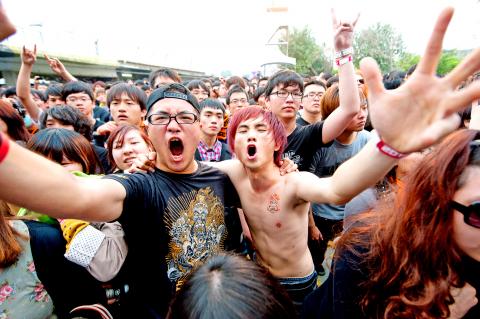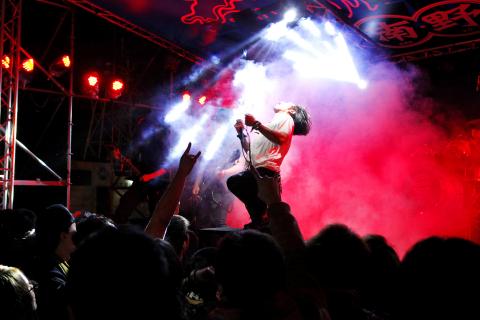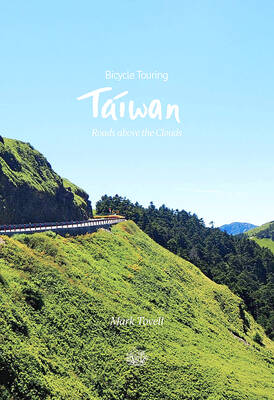Last year, there was a lull in the music festival scene, as two of the biggest rock festivals, Formoz and Megaport went on hiatus. Next weekend, there are two large multi-stage music festivals taking place at the same time, Megaport in Kaohsiung and T-Fest in Taipei.
They occur just one week before Spring Scream, Taiwan’s oldest and most famous music festival, with over 100 bands. It is safe to say, every band and DJ on the island worth seeing will be playing somewhere the last weekend of March or the first weekend of April, and audiences and allegiances will be torn.
In Kaohsiung, Megaport will have 84 acts on six stages, including several metal or punk bands from Japan, including Fact, Alexandros and Straightener and the Hong Kong film star and singer Anthony Wong (黃秋生). There will be more than 70 local Taiwanese bands playing, including indie favorites like LTK Commune (濁水溪公社), the Aboriginal singer-songwriter Panai (巴奈), singer Chen Hui-ting (陳惠婷, formerly of Tizzy Bac) and many more, giving the fest a very local vibe.

Photo courtesy of Tsuji Music
“The festival will reflect the character of south Taiwan, which is a sort of old-style, macho coolness,” says Freddy Lim (林昶佐), the main organizer, who is also lead singer of the metal band Chthonic (閃靈).
T-Fest, being held for the first time, is organized by The Wall and boasts a highly international lineup. It has 57 acts playing on five stages, including a late-night electronic music dance party stage. The lineup includes more than two dozen international acts, including the Danish shoegaze band Mew, US indie band Cloud Nothings and American techno DJ Gunnar Halsam, among others.
So why are both festivals happening on the same weekend?

Photo courtesy of Tsuji Music
Lim says they announced their event dates about a month before T-Fest. “We didn’t want to be so close to Spring Scream,” he says, “but the Kaohsiung government was doing major construction on the event site, so the venue would not have been ready for use in early March, which is the normal time for Megaport. So we had to hold the festival at the end of the month.”
As for T-Fest: “We had decided to do this festival in March quite early on, and since this event is mainly for Taipei, we weren’t so concerned about the overlap,” says Kuma Chen (陳玠安), a spokesperson for The Wall.
“Also, several bands we wanted to book were touring Asia just at this time, so these were just the most convenient dates,” Chen added.
The “T” in T-Fest has multiple meanings — today, tomorrow, Taipei, Taiwan — and has nothing to do with the Taiwanese slang for “lesbian” (“T” is short for “tomboy”).
There are a lot of great bands at both events, though I seriously doubt I’ll be shuttling back and forth on the High Speed Rail to take them all in. My top pick for T-Fest would have to be Turtle Island, which is something like Japan’s answer to the Pogues. Their repertoire draws from Japanese folk songs and they bang with wooden sticks on big, kettle-shaped taiko drums, but they also have mohawks and play with a rowdy punk attitude. Unfortunately, I find T-Fest’s shoegaze headliners fairly boring, but the Japanese post-hardcore group Envy is pretty awesome, and the fest is adding a visual art component to the event, which in theory, sounds interesting.
My “not to be missed” set at Megaport would be LTK Commune, which brings punk attitude to Taiwanese nakashi music and is known to add outrageous stage performances. Flesh Juicer (血肉果汁機) is a young punk band that’s rowdy, loud and fun. The lead singer wears a rubber pig mask, so they are fairly easy to spot. Both are great bands to dance to while spraying Taiwan beer on your friends.
Getting back to the overlap — there is of course a long, complicated backstory to all this.
Lim started Megaport in Kaohsiung 10 years ago, and the festival has grown to become a major music event in south Taiwan, with strong support from the Kaohsiung city government. After a couple early editions to the event, management was handed over to The Wall, which Lim founded with a couple other investors. As Lim began devoting time to his metal band Chthonic and other pursuits, he became less involved in management at The Wall. In 2013, Megaport drew 10,000 fans a day and was a raging success.
Then in late 2013, Lim and The Wall’s other founders were bought out by the CEO, Orbis Fu (傅鉛文). Ownership of festival brands like Megaport and Formoz were reclaimed by Lim, and Megaport took a break last year to reboot. Lim and many of his old colleagues decided to return to organize the event this year, and for the theme, they chose rensheng (人生), which literally means “life,” but with the connotation “that’s life” or “life ain’t easy.”
“It’s the idea that you might come to this music festival and see your ex-girlfriend with another guy,” says Lim. “It’s about moving on and relationships changing, and having a lot of contradictory, confusing feelings.”
So, it is basically about the state of Taiwan’s indie music scene today.
■ Megaport will be held March 28 and 29 from 12pm to 10pm at Kaohsiung’s Pier-2 Arts Center (駁二藝術特區). Advance tickets are NT$1,600 for two-day passes, or NT$900 for single day through www.indievox.com or 7-Eleven iBon. At the gates, tickets will be NT$1,800 for two-day passes, or NT$1,000 for single day. For more info, check: www.megaportfest.com.
■ T-Fest will be held from next Friday to March 29 at Taipei’s Flora Expo Park (台北花博公園). Friday’s performances go from 8pm to 5am, Saturday from 11:40am to 5am, and Sunday from 11:40am to 10:20pm. Two-day tickets are NT$3,800 in advance through FamiPort or at the Wall, or NT$4,200 at the door. Single day passes are NT$2,200 in advance, or NT$3,000 at the door. For info on line-ups and other ticket packages, check: tfest.tw.

Last week, Viola Zhou published a marvelous deep dive into the culture clash between Taiwanese boss mentality and American labor practices at the Taiwan Semiconductor (TSMC) plant in Arizona in Rest of World. “The American engineers complained of rigid, counterproductive hierarchies at the company,” while the Taiwanese said American workers aren’t dedicated. The article is a delight, but what it is depicting is the clash between a work culture that offers employee autonomy and at least nods at work-life balance, and one that runs on hierarchical discipline enforced by chickenshit. And it runs on chickenshit because chickenshit is a cultural

My previous column Donovan’s Deep Dives: The powerful political force that vanished from the English press on April 23 began with three paragraphs of what would be to most English-language readers today incomprehensible gibberish, but are very typical descriptions of Democratic Progressive Party (DPP) internal politics in the local Chinese-language press. After a quiet period in the early 2010s, the English press stopped writing about the DPP factions, the factions changed and eventually local English-language journalists could not reintroduce the subject without a long explanation on the context that would not fit easily in a typical news article. That previous

It’s hard to know where to begin with Mark Tovell’s Taiwan: Roads Above the Clouds. Having published a travelogue myself, as well as having contributed to several guidebooks, at first glance Tovell’s book appears to inhabit a middle ground — the kind of hard-to-sell nowheresville publishers detest. Leaf through the pages and you’ll find them suffuse with the purple prose best associated with travel literature: “When the sun is low on a warm, clear morning, and with the heat already rising, we stand at the riverside bike path leading south from Sanxia’s old cobble streets.” Hardly the stuff of your

April 29 to May 5 One month before the Taipei-Keelung New Road (北基新路) was set to open, the news that US general Douglas MacArthur had died, reached Taiwan. The military leader saw Taiwan as an “unsinkable aircraft carrier” that was of huge strategic value to the US. He’d been a proponent of keeping it out of Chinese Communist Party (CCP) hands. Coupled with the fact that the US had funded more than 50 percent of the road’s construction costs, the authorities at the last minute renamed it the MacArthur Thruway (麥帥公路) for his “great contributions to the free world and deep